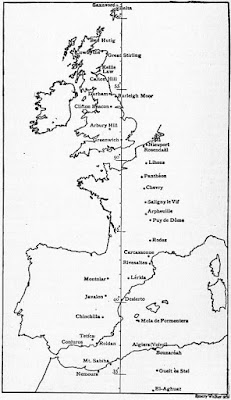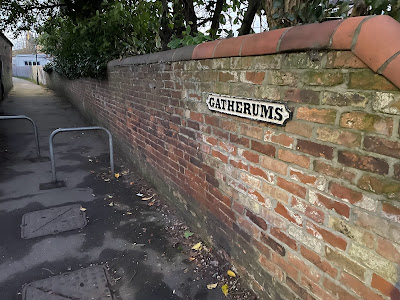
There's a small town near Solihull in the Midlands called Meriden and for a long time this was held to be the centre of England. However the Ordnance Survey in 2020 made some new calculations - which in fact anyone can do without the aid of maths skills. Basically all you have to do is make a cardboard cutout of a map and find the point where it will balance on the tip of a pencil. This in geometric parlance is defined as the 'Centroid' and the OS found that England's centroid is in a field in Leicestershire. (The Centroid of the UK is in the middle of Morecambe Bay - there's a thing to ponder on!) The place name Meriden comes from the Old English for 'pleasant valley' and it's only coincidental that the the town's location is somewhere in the middle of the country. However the somewhat similar word 'Meridian' is certainly connected to the middle of something as it comes from the Latin word for Midday. And so, at around midday, we stood on the Meridian line in the middle of Louth in Lincolnshire. Any place on the Meridian Line, as any schoolboy used to know, has a longitude of zero. Following a Saturday parkrun round the pork pie metropolis of Melton Mowbray we had headed up for a short break in Louth, an unspoilt market town somewhat off the beaten track but bang on the line that heads north from Greenwich (as illustrated in the above chart.)
 |
| Gather whats you might well ask! |
Louth is full of little ginnels or alleyways connecting the various ancient streets, here's one called Gatherums, we also came across others called Paradise Smoot and Kitkat which all seemed to lead towards what was formerly a rather disreputable part of town called Aswell Hole. This is the site of an important spring which provided a water supply for the fulling industry. Fulling was a medieval process for cleaning wool ready for weaving and you can imagine the Lincolnshire Wolds sheep farmers bringing fleeces to market many years ago. These farmers might well have also refreshed themselves with the products of the breweries located close to the spring. We took a walk along Gatherums and found a plaque in the pathway delineating the Meridian Line - here we were at Longitude Zero - what excitement!
 |
| Poor Thomas! |
Here's a fine view up West Street towards St James Church which happens to have the tallest steeple on an English medieval church. And an imposing church it is too with fine stained glass windows one dedicated to one Philadelphus Coltman who lived to the ripe old age of 89. St James was where the Lincolnshire Uprising began in 1536, this was a protest against Henry VIII's suppression of the monasteries and eventually 40,000 demonstrators marched to Lincoln (that's a lot of sheep farmers!) The rising was put down by the military and the ringleaders were arrested. As a teenage boy I frequented a fish and chip shop in our village run by a couple called Tom and June. June and her assistant chatted away every evening to the post pub crowd who came in for their pudding and chips, whereas Tom didn't say much. One thing that I did hear him say, very authoritatively, on several occasions was "They never hung a Thomas!" which I remembered for many years. Various Thomas's were despatched in medieval times using a number of traditional methods, Thomas Cromwell lost his head, Thomas Cranmer was burned at the stake and, as we found out in deepest Lincolnshire, Thomas Kendall, the vicar of Louth was hung at Tyburn for his part in the uprising!

We didn't confine ourselves to Louth itself despite it's wealth of attractions. It's about half an hour to the coast from Louth and we took a trip down quiet country lanes to Mablethorpe, an ice cream and amusement arcade seaside town surrounded by caravan parks. Several miles north along the coast road we took Skip for a walk into a vast nature reserve. In the midst of the huge area of marshland and beaches we spotted the remains of a battle tank (marked on Google Earth!) which is apparently a bit of a tourist attraction. Well we did find one other visitor there who told us she regularly walks her dog here. I found out later that the skeleton was of a Comet tank which was the predecessor to the Centurion tank, this particular one had been used as target practice by the RAF! So in brief this was an eventful trip full of unexpected surprises, if you want to find a corner of England that seems to have not quite made it into the 21st Century try Louth. We enjoyed the peace and quiet and the unspoilt town centre (and the pubs!)




No comments:
Post a Comment